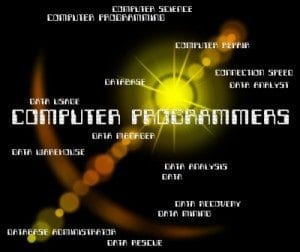MBTI® Test INTJ Computer Programmers
Strong Interest Inventory® General Occupational Theme Code: Investigative, Conventional (IC)
The Myers-Briggs Test Type Indicator® can provide valuable insights into an optimal career choice. For instance, Hammer (1996) writes that MBTI test INTJ’s tend to lean towards careers in the natural and applied sciences because they provide opportunities to analyze problems and develop solutions. These challenges offer INTJ’s the chance to exercise their conceptual prowess, analytical thinking, and ability to solve local problems while maintaining a long-range vision.

Image courtesy of Stuart Miles at FreeDigitalPhotos.net
Programmers write, edit, and test the codes that make computer programs and applications run. They often work off of criteria or specifications that developers present to them, but can also develop their own software as well. This could involve writing, analyzing, updating, or even entirely rewriting programs for a variety of reasons, such as decreasing bugs, increasing operating efficiency, or even meeting a new set of specifications of requirements. To do this, especially as part of a design or programming team, computer programmers may need to develop workflow charts or diagrams to visually display the changes that need to be made as well as the logic and rationale that supports those proposed changes. They might also need to analyze programs to identify problem areas, and then mark areas that need to be changed so that other teams or team members can solve the identified issues.
Programmers also need to work with other professionals, including managers, engineers, and executives to better understand particular problems, and to present their proposed changes in a coherent way that is understandable even to people with different skill sets. This could involve documenting and presenting changes to keep others informed of their progress.
Being a successful programmer requires a mastery of a variety of computers and hardware and software, including desktops, laptops, server configurations, mainframe operating systems, and more. Depending on the specialization of the individual programmer and of the organizations they work for, they might need to know a variety of different languages, such as C++; Greatis Object Inspector; PowerSoft PowerBuilder; Python. They could also need to be able to effectively use compiler and decompiler software, interface and query software, and development software. Because this field is very logical and technical, a detailed understanding of math, computers, and electronics is necessary. Programmers also need to have a strong foundation in English, as well as knowledge of the fields for which they are programming, which may include business, strategic management, and human resource modelling.
-
MBTI® Career Report
Price: $62.95 Buy NowDIGITAL DELIVERY
- Receive an in-depth 10-page report on your occupational matches
- Explore your preferred work tasks, environments, and industry matches
- Assessment sent digitally within 2-3 business hours of purchase
Because programmers often need to identify and resolve complex problems, they need to have strong active listening, critical thinking, and reading comprehension skills. These together will help them understand fully the needs of their clients. They also need to be able to conceptualize logical data, as well as cause and effect of particular commands so they can write successful programs and identify the errors in buggy programs. In order to develop these skills, most professional programmers have at least a four-year bachelor’s degree, generally in computer science or engineering. However, some do not, and instead have a considerable amount of on-the-job or vocational training.
INTJ’s are particularly well-suited to programming careers because they are naturally analytical and pay a close attention to detail. They can also function effectively in environments that are stressful and require a high degree of independence.
Below are some employment trends for Computer Programmers:
- Median wage: $41.61 hourly, $86,550 annually
- Employment: 250,300 employees
- Projected growth (2018-2028): Decline (-2% or lower)
- Projected job openings (2018-2028): 15,100
Visit Our MBTI® About Page and Our INTJ Personality Type Page for Detailed Information on The INTJ Personality Type
Visit Our Strong Interest Inventory® Resource Page to Learn About the IC GOT
Click on one of these corresponding popular INTJ Careers for detailed information including Career Stats, Income Stats, Daily Tasks and Required Education: Anesthesiologist, Electronics Engineers, Biochemist, Industrial Engineers, Biologist, Information Security Analysts, Chemical Engineers, Lawyer, Computer Programmer, Surgeon.
Explore Our INTJ Blog Pages
Explore additional information that delves deeper into the INTJ Personality Type by examining various personality and career based subjects:
- How the MBTI INTJ Type relates to Innovation
- How the MBTI INTJ Type relates to Project Management
- How the MBTI INTJ Type relates to Emotional Intelligence
- How the MBTI INTJ Type relates to Leadership
- How the MBTI INTJ Type Communicates
Click on a link below to read more about different MBTI Personality Types
| ISTJ | ISFJ | INFJ | INTJ | ESTP | ESFP | ENFP | ENTP |
| ISTP | ISFP | INFP | INTP | ESTJ | ESFJ | ENFJ | ENTJ |
References
Bureau of Labor Statistics wage data and 2012-2022 employment projections Onetonline.org
MBTI® Type Tables for Occupations, 2nd Edition. Schaubhut, N. & Thompson, R. (CPP, 2008)
Introduction To Type and Careers. Hammer, A. (CPP, 1996).

